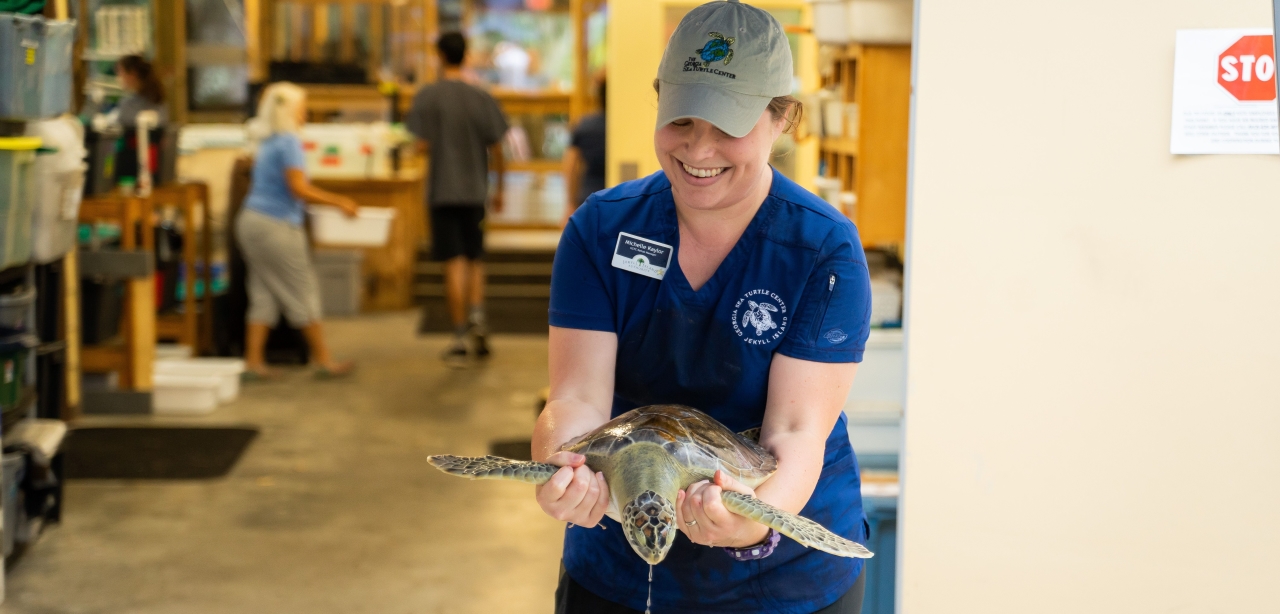An Interview with Georgia Sea Turtle Center Director, Michelle Kaylor
Home to Rocky Top and the Great Smoky Mountains. The birthplace of Moon Pies, Mountain Dew soda, and the world’s oldest radio show. And the native state of the leader of a highly successful sea turtle rehabilitation hospital.
It may seem as if one of these things is not like the other. But in truth, it’s, well, true. Tennessee was once the birthplace and home of Michelle Kaylor, now director of the Georgia Sea Turtle Center. Since 2007, Kaylor has worked at the Jekyll Island operation and has served as its Director for the past two years. Kaylor follows in the footsteps of Center founder and long-time director, and her mentor, Dr. Terry Norton.
Though her roots sprouted in a landlocked state, Kaylor admits she has long had a fascination with marine life. The marine dream started in 5th grade, when her school took students on what would become a very inspirational and influential field trip to Jekyll Island and its former 4-H facility (now Camp Jekyll). It was there Kaylor first tromped through marsh mud, seined the ocean, and took in vast exploration of the island’s well-preserved maritime forest.
Needless to say, “I was hooked,” she said.
Fast forward a few years, and Kaylor would study to become a marine biologist, specializing in aquarium sciences. She found herself then nestled at the Tennessee Aquarium for seven years, where she oversaw the exhibits showcasing large marine creatures, and one of two resident sea turtles the Aquarium acquired. This shelled gem was a green sea turtle named Oscar, who was taken in after a boat strike and had paralysis in the hind flippers with an inability to adequately dive. Though the aquarium was hesitant at first to take in the less-than-perfect specimen, it proved key for the educational exhibit.
“Having an imperfect representation of a species and a story behind why this happened to this animal is inspiring and allows more conversations for what visitors can do to help the species in the wild,” she said.
Speaking of wild, the story of how Oscar came to the Tennessee tourism staple was just that. When Kaylor went to pick Oscar up to bring him back to what would become his new home, “It was in a McDonald’s parking lot in Pigeon Forge,” she said.
“The last place I ever thought I would see a sea turtle alone (was) in a McDonald’s parking lot. The staff member caring for Oscar at the Ponce Inlet Marine Science Center brought Oscar up to Tennessee on the way to visit her family,” she said, and the rest was fast-food conservation history.
On Jekyll, sea turtles aren’t generally found in fast food parking lots either, but rather come to the now 16-year-old Center, typically due to boat-strike injuries like the one Oscar had, debilitation, cold-stunning, and other reasons. Annually, some 150,000 visitors trek through the Center, which is operated by the Jekyll Island Authority.
Aside from up-close views of these animals in their rehab tanks, and the occasional glimpse of one of the patients in surgery, the Center serves multiple purposes. At once, it is a hospital, rehabilitation, and research hub, as well as a beloved platform for educational programs. The latter purpose serves to increase awareness of sea turtle habitats and highlight wildlife conservation challenges, “promote responsibility for ecosystem health, and empower individuals to act locally, regionally, and globally to protect the environment,” Kaylor said.
However, after almost two decades serving this core mission, the Center’s purpose has grown, and, as should be expected, growing pains linger. “My goal is to expand on our mission as we plan for a future Center expansion, where we can satisfy growing operational needs and further serve our educational mission,” she said.
With such growth, Kaylor hopes to see the Center’s signature shining moments of marine life conservation and education continue as it inspires its visitors, as well as the hands which make the educational attraction so special. The Center is admittedly a fantastic venue for, yes, educating the public, but likewise serves as a unique vessel for educating those who help the landmark in its daily operations.
To date, she said, her most proud achievements are being able to witness an individual come to the Center, be it as a staff member, an intern or a volunteer, and see them grow as a professional and as a person.
“We strive every day at the Center to have small yet powerful moments of learning that can add up to large-scale change by telling each sea turtle patients’ story,” Kaylor said. “We can inspire others to make changes in their own lives, and (who then can) inspire others as well. We call this the ‘ripple effect’. My proudest achievement is seeing the ripples move outward into the world with our mission and stories.”
And while turtles are known for moving at a slow pace, Kaylor and the Center team are moving quickly, now and since the Center’s inception, to do just that.
For more information about the Georgia Sea Turtle Center, visit jekyllisland.com/gstc. To help support and further the Center’s mission, click HERE.
